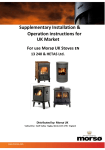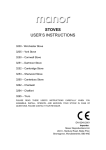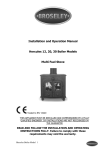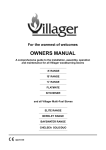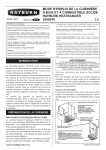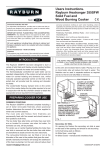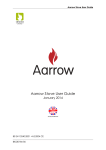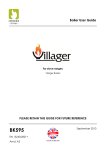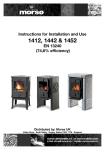Download Morso UK 1630 Instruction manual
Transcript
Supplementary Installation & Operation instructions for UK Market For use Morsø UK Stoves EN 13 240 & HETAS Ltd. Distributed by: Morsø UK Valley Drive · Swift Valley · Rugby, Warks CV21 1TW · England MORSØ JERNSTØBERI A/S . DK-7900 NYKØBING MORS E-Mail: [email protected] · Website: www.morsoe.com SUPPLEMENTARY INSTALLATION INSTRUCTIONS FOR USE WITH MORSØ UK STOVES PLEASE READ THE INSTRUCTION MANUAL AND THESE SUPPLEMENTARY INSTRUCTIONS CAREFULLY BEFORE INSTALLATION In all cases the installation must comply with current Building Regulations, Local Authority Byelaws and other specifications or regulations as they affect the installation of the stove. It should be noted that the Building Regulations requirements may be met by adopting the relevant recommendations given in British Standards BS 8303, BS 6461 and BS 7566 as an alternative means to achieve an equivalent level of performance to that obtained following the guidance given in Approved Document J. Please note that it is a legal requirement under England and Wales Building Regulations that the installation of the stove is either carried out under Local Authority Building Control approval or is installed by a Competent Person registered with a Government approved Competent Persons Scheme. HETAS Ltd operate such a Scheme and a listing of their Registered Competent Persons can be found on their website at www.hetas.co.uk. Health and Safety Precautions Care must be taken when installing the stove such that the requirements of the Health and Safety at Work Act are met. Handling Adequate facilities must be available for loading, unloading and site handling. Stove weights including packaging Model N° Weight Kg Model N° Weight kg Model N° Weight Kg 1410 70 3410 110 4560 93 1412 70 3440 127 5060 115 1430 72 3610 220 Ø4 86 1440 90 6140 105 Ø6 112 1442 90 6148 118 Ø6 145 1630 145 7110 140 2110 115 8140 165 2140 140 8141 192 3112 95 8142 190 3142 113 8147 204 Fire Cement Some types of fire cement are caustic and should not be allowed to come into contact with the skin. In case of contact wash immediately with plenty of water and consult manufacturers guidelines. Asbestos Morsø stoves do not contain asbestos. If there is a possibility of disturbing any asbestos in the course of installation then please seek specialist guidance and use appropriate protective equipment. Stove Performance In the UK these stoves have been approved by HETAS Ltd as an intermittent operating appliance for burning wood logs only. It should be noted that it is an offence to burn wood logs in a stove if it is installed within a Smoke Control Area in the UK unless the stove is approved to do so. The nominal heat outputs for the various stoves are as follows: Model N° Nominal Heat Output KW Net Eff % Gross Eff % Model N° Nominal Heat Output KW Net Eff % Gross Eff % 1410 4,5 76 69,2 6140 5,9 80.1 72,9 1412 5 74.6 67,9 6148 5,9 80.1 72,9 1430 4,6 71 64,6 7110 5,4 75.5 68,7 1440 4,5 76 69,2 8140 6,3 80.3 73,3 1442 5 74.6 67,9 8141 6,3 80.3 73,3 1630 10,5 74 64,3 8142 6,3 80.3 73,3 2110 9 72 65,5 8147 6,3 80.3 73,3 2140 5,6 76 69,2 4560 4,2 72 65,5 3112 5 81 73,7 5060 5,8 70 65,7 3142 5 81 73,7 Ø4 5,6 81 73,7 3410 6,5 80.1 72,9 Ø6 7,7 75 68,3 3440 6,5 80.1 72,9 Ø8 9,3 75 65,5 3610 9,8 74 67,3 Prefactory Work and Safety Checks There must not be an extractor fan fitted in the same room as the stove as this can cause the stove to emit fumes into the room. Chimney NOTE: A chimney height of not less than 4.5 metres measured vertically from the outlet of the stove to the top of the chimney should be satisfactory. Alternatively the calculation procedure given in BS 5854:1980 may be used as the basis for deciding whether a particular chimney design will provide sufficient draught. If installation is into an existing chimney then it must be sound and free from cracks or other faults which might allow fumes into the property. Any existing chimney must be clear of obstruction and have been swept clean immediately before installation of the stove. If the stove is fitted in place of an open fire then the chimney should be swept one month after installation to clear any soot falls which may have occurred due to the difference in combustion between the stove and the open fire. If there is no existing chimney then either a prefabricated block chimney in accordance with Building Regulations Approved Document J or a twin walled insulated stainless steel flue to BS 4543 can be used. These chimneys must be fitted in accordance with the manufacturer’s instructions and Building Regulations. A single wall metal fluepipe is suitable for connecting the stove to the chimney but is not suitable for using for the complete chimney. The chimney must have a minimum diameter of 150 mm and its dimension should be not less than the size of the outlet spigot of the stove. Any bend in the chimney or connecting fluepipe should not exceed 45°. 90° bends are not permitted. Combustible material should not be located where the heat dissipating through the walls of fireplaces or flues could ignite it. Therefore when installing the stove in the presence of combustible materials due account must be taken of the guidance on the separation of combustible material given in Building Regulations Approved Document J and also in the stove installation instructions. If it is found that there is excessive draught in the chimney then a draught stabiliser should be fitted. The chimney can be swept through the stove if the stove is connected via the top flue outlet. When installing via the rear flue outlet adequate provision e.g. easily accessible soot door or doors must be provided for sweeping the chimney and connecting fluepipe. It may also be necessary to provide additional sweeping access when fluing through a register plate. Hearth The hearth should be able to accommodate the weight of the stove and its chimney if the chimney is not independently supported. The weight of the stove is indicated in the brochure. The stove should always be installed on a non-combustible hearth of a size and construction that is in accordance with the provisions of the current Building Regulations Approved Document J. The clearance distances to combustible material beneath, surrounding or upon the hearth and walls adjacent to the hearth should comply with the guidance on the separation of combustible material given in Building Regulations Approved Document J and also in the stove instructions. If the stove is to be installed on a wooden floor, it must be covered with a non-combustible material at least 12mm thick, in accordance with Building Regulations Approved Document J, to a distance of 30 cm in front of the stove and 15 cm to each side measuring from the door of the combustion chamber. Combustion air supply In order for the stove to perform efficiently and safely there should be an adequate air supply into the room in which the stove is installed to provide combustion air. The provision of air supply to the stove must be in accordance with current Building Regulations Approved Document J. An opening window is not appropriate for this purpose. Commissioning and handover Ensure loose parts are fitted in accordance with the stove instruction booklet. On completion of the installation allow a suitable period of time for any fire cement and mortar to dry out, when a small fire may be lit and checked to ensure the smoke and fumes are taken from the stove up the chimney and emitted safely to atmosphere. Do not run at full output for at least 24 hours. On completion of the installation and commissioning ensure that the operating instructions for the stove are left with the customer. Ensure to advise the customer on the correct use of the appliance with the fuels likely to be used on the stove and warn them to use only the recommended fuels for the stove. Advise the user what to do should smoke or fumes be emitted from the stove. The customer should be warned to use a fireguard to BS 6539 in the presence of children, aged and/or infirm persons. Supplementary Operating Instructions for use with Morsø UK stoves PLEASE READ THE INSTRUCTION MANUAL AND THESE SUPPLEMENTARY INSTRUCTIONS CAREFULLY BEFORE USING THE STOVE. Warning Note Properly installed, operated and maintained this stove will not emit fumes into the dwelling. Occasional fumes from de ashing and re fuelling may occur. However, persistent fume emission is potentially dangerous and must not be tolerated. If fume emission does persist, then the following immediate action should be taken: (a) (b) (c) (d) Open doors and windows to ventilate room. Let the fire go out or eject and safely dispose of fuel from the appliance. Check for flue or chimney blockage and clean if required. Do not attempt to relight the fire until the cause of the fume emission has been identi fied and corrected. If necessary seek expert advice. The most common cause of fume emission is flueway or chimney blockage. For your own safety these must be kept clean at all times. Important Notes General Before lighting the stove check with the installer that the installation work and commissioning checks described in the installation instructions have been carried out correctly and that the chimney has been swept clean, is sound and free from any obstructions. As part of the stoves’ commissioning and handover the installer should have shown you how to operate the stove correctly. Use of fireguard When using the stove in situations where children, aged and/or infirm persons are present a fireguard must be used to prevent accidental contact with the stove. The fireguard should be manufactured in accordance with BS8423:2002. Chimney cleaning The chimney should be swept at least once a year for smokeless fuels and a minimum of twice a year for wood and other fuels. It is important that the flue connection and chimney are swept prior to lighting up after a prolonged shutdown period. If the stove is fitted in place of an open fire then the chimney should be swept one month after installation to clear any soot falls which may have occurred due to the difference in combustion between the stove and the open fire. In situations where it is not possible to sweep through the stove the installer will have provided alternative means, such as a soot door. After sweeping the chimney the stove flue outlet and the flue pipe connecting the stove to the chimney must be cleaned with a flue brush. Extractor fan There must not be an extractor fan fitted in the same room as the stove as this can cause the stove to emit smoke and fumes into the room. Aerosol sprays Do not use an aerosol spray on or near the stove when it is alight. Use of operating tool, handle and mitten. Always use the correct door handle, operating tool and mitt provided when handling parts likely to be hot when the stove is in use. Chimney Fires If the chimney is thoroughly and regularly swept, chimney fires should not occur. However, if a chimney fire does occur immediately contact the fire brigade; turn the air control setting to the minimum if it is safe to do so. This should cause the chimney fire to go out in which case the control should be kept at the minimum setting until the fire in the stove has gone out. After a chimney fire the chimney should be carefully examined for any damage. Expert advice should be sought if necessary. Permanent air vent The stove requires a permanent and adequate air supply in order for it to operate safely and efficiently. In accordance with current Building Regulations the installer may have fitted a permanent air supply vent into the room in which the stove is installed to provide combustion air. This air vent should not under any circumstances be shut off or sealed. HETAS Ltd Approval The appliances covered by this manual have obtained HETAS Ltd approval for burning wood logs only. Please note that HETAS Approval only covers the use of wood on the stove and approval does not cover the use of other fuels either alone or mixed with wood, nor does it cover instructions for the use of other fuels. USER OPERATING INSTRUCTIONS - WOOD For pure wood burning stoves and multi fuel stoves operating with wood, please refer to the main installation and operating manual. User Operating Instructions - Solid Smokeless Fuels (If appropriate*) Model N° Fuel Model N° Fuel Model N° Fuel 1410 Multi-fuel 3112* Multi-fuel 8140 Wood only 1412 Multi-fuel 3142* Multi-fuel 8141 Wood only 1430 Multi-fuel 3410* Multi-fuel 8142 Wood only 1440 Multi-fuel 3440* Multi-fuel 8147 Wood only 1442 Multi-fuel 3610 Wood only 4560 Wood only 1630 Multi-fuel 6140 Wood only 5060 Wood only 2110 Multi-fuel 6148 Wood only Ø4 Multi-fuel 2140 Wood only 7110 Wood only Ø6 Multi-fuel Ø8 Multi-fuel Recommended fuels The following natural or manufactured smokeless fuels may be burnt on this stove: Ancit, Anthracite Small Nuts, Coalite Phurnacite, Sunbrite Doubles, Fireglo ovoids Taybrite Pureheat Maxibrite Newflame Supacite Only authorised smokeless fuels may be used in smoke control areas. PETROLEUM COKE AND BITUMINOUS HOUSE COAL ARE NOT SUITABLE FOR USE ON THIS STOVE, ITS USE WILL INVALIDATE THE WARRANTY At first you may find it helpful to try several fuels to find the most suitable. If you are unable to obtain the fuel you want ask your fuel distributor to suggest an alternative. Further details of recommended fuels can be obtained from the HETAS Ltd “Official guide to approved solid fuel products and services” which is available on their website at www.hetas. co.uk. Guidance can also be obtained from the Solid Fuel Association at 7 Swanwick Court, Alfreton, Derbyshire, DE55 7AS (Tel: 0800 600 000 or www.solidfuel.co.uk). Lighting of fire A lot of air is needed when first lighting the stove. When starting with a totally cold stove, it may be helpful to leave the door ajar (2-3cm) during the first few minutes; the primary air intake should be fully open. Under poor draft conditions, adding secondary air will help the lighting process. Place some firelighters or paper and dry kindling wood on the grate and cover with a small amount of fuel; ignite the firelighters or paper. Allow fire to establish for a few minutes and then close the door, continue to burn the stove with both primary and secondary air controls open until the fuel is well alight. Load the stove with more fuel and adjust air controls to the required level of heat output. Before relighting the fire clean the fire bed of ash and clinker and empty the ashpan. Controlling the burning rate When operating the stove with solid fuels the combustion air supply should be predominantly controlled by the primary air intake. The primary air on many of the stoves is controlled by an air spinner on the ash door or on the bottom of the main door. In the case of the Morsø Owl 3410, 3440 and the Ø range the primary air is controlled via a lever below the ash lip (please refer to main instructions) Riddling and ash clearance Riddling twice a day is usually sufficient. The fire should be riddled with all doors shut. Never allow ash to accumulate in the ashpan such that it comes into contact with the underside of the grate as this will cause it serious damage. The ashpan should be emptied regularly before it becomes too full. Use the tool provided to remove the ashpan. Care should be taken to ensure that any hot ash is cool before emptying it into plastic liners or bins. Refuelling Keep the firebox well filled, the fuel may be sloped up from the front fire bars toward the back of the stove but do not allow fuel to spill over the top of the front fire bars or restrict any tertiary air inlets. Take care that fuel does not project over the front fire bars or damage to the glass may be caused. Empty the ashpan, if required, and then riddle the fire. If the fire is very low then it may be necessary to add a small amount of fuel and adjust the air control to maximum for a brief period until the fire is burning well before fully re-fuelling the stove. After refuelling continue to operate the stove at full rate for a short time before reducing the air controls for overnight burning. Reduced or overnight burning Some experimentation may be necessary to find the air control setting most suitable for the particular fuel used and the draw on the chimney and the level of heat output required, but generally the air control should be turned down to the minimum setting for overnight burning. Please note some sooty deposits or discolouration to the glass may occur when the stove is slumbered overnight. This should clear once the fire is restored to a good operating temperature. It may also be necessary to periodically clean the glass; Morsø glass cleaner is available from your dealer. To revive the fire, empty the ashpan if necessary, riddle, and turn the air control setting to maximum. When the fire is burning well load on more fuel as necessary and turn the air control setting to the desired setting. Flueway cleaning It is important that the baffle plate and all the stove flueways are kept clean. When burning smokeless fuels they should be inspected and cleaned at least once a month. More soot will be deposited on the baffle plate and in the flueways if the stove is run at low levels for long periods. If this is the case then more frequent cleaning will be necessary. Cleaning and Maintenance Please see “Routine Stove Maintenance” contained in the main instruction manual. Trouble shooting, tips & hints 1. Glass discolouration Check that: • If wood burning, the moisture content is not too high. • If wood burning, the logs are not oversized (logs greater than 100mm diameter should be split). • If wood burning, the combustion air is supplied via the secondary air control. • If burning solid fuel, an approved fuel is being used. 2. Glass cracking Check that: • A quality approved fuel is being used without impurities. Impurities sometimes called “stones” can explode inside the firebox and damage the glass. • If the glass has recently been replaced, ensure it is authorised Morsø glass. Morsø use only 5mm thick glass, it is false economy to use inferior 3 or 4mm replacement glass. • If the glass cracked when the stove was not being used: there are likely to be signs of corrosion on the door frame behind the glass. When the stove is out of use for prolonged periods it is important to remove any ashes and vent the stove. Differences in room, flue, and stove body temperature can result in condensation inside the stove; if this moisture comes into contact with any ashes or gaskets it may result in corrosion and acid corrosion from the ashes. Rust behind the glass will push the glass away from the door frame plac- ing pressure on the glass at the fixing points; the resulting crack usually runs from clip to clip. 4. Fire Will Not Burn Check that: • If wood burning, the moisture content is not too high. • If wood burning, the logs are not oversized (logs greater than 100mm diameter should be split). • The correct air control is being used for the fuel being burnt, i.e. Primary air for solid fuel and secondary air for wood burning. • The air inlet is not obstructed in any way. • That the chimneys and flueways are clear. • That there is an adequate air supply into the room. • That an extractor fan is not fitted in the same room as the fire. 10 5. Fire Blazing Out Of Control Check that: • The door or doors are correctly closed. • The door seals are in good condition. • The main body gaskets are in good condition. With the stove running trace along the joints of the stove with a burning incense stick; if the smoke trail is drawn into the stove at any point it would indicate a defective seal. Important note: All Morsø stoves use the same ceramic rope gasket for doors and main body castings. The use of unauthorised non Morsø gaskets during routine maintenance commonly results in: • • • Pressure on the casting and fixing point which can lead to cracking. Inability to fit components due to insufficient compression of the gasket. Inability to close the door or excessive force required to close the door resulting in dam- age to both the door casting and the glass. The following kits are available from your authorised Morsø dealer: • Sealing rope 2mtr x Ø8mm (doors & body parts)62903100 • Sealing kit for doors and bogy parts with adhesive62904300 • Self adhesive ladder gasket for glass 2mtr x 8mm62903800 • Glass kit 1410 inc gasket, clips & screws 62904000 • Glass kit 1440 inc gasket, clips & screws 62904100 • Glass kit 1430 inc gasket, clips & screws62904200 11 Morsø Jernstøberi A/S - 06.12.2007 - 72202900 MORSØ JERNSTØBERI A/S . DK-7900 NYKØBING MORS E-Mail: [email protected] · Website: www.morsoe.com












